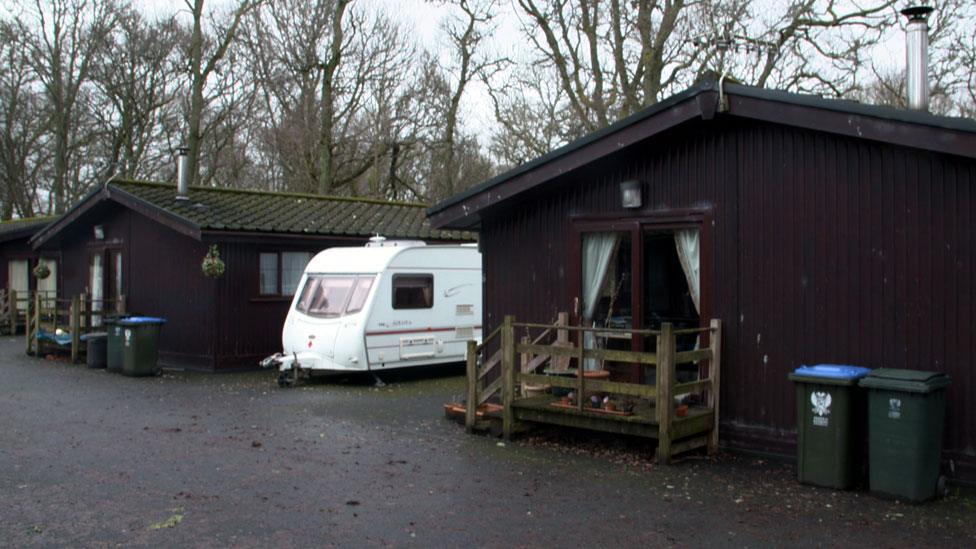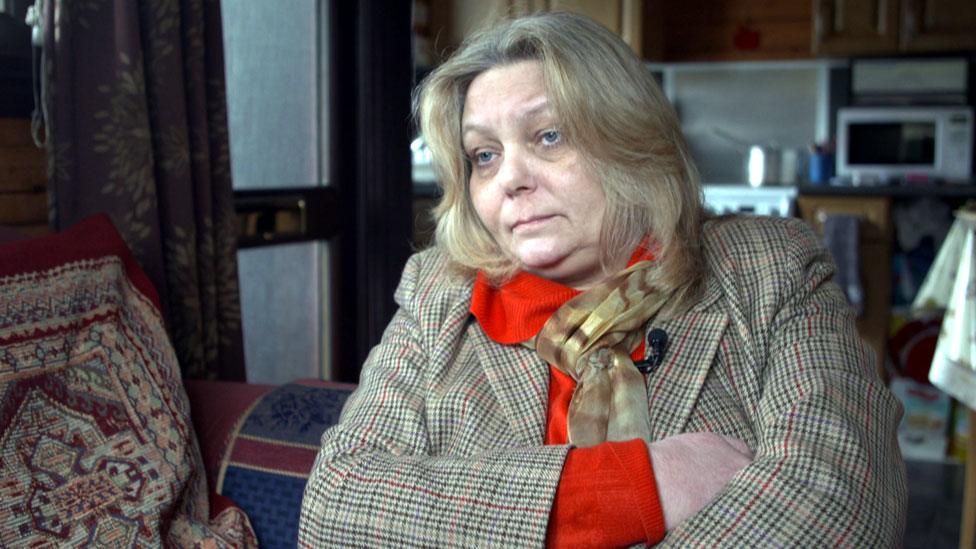Apology demanded for gypsy traveller 'Tinker Experiment'
- Published
Shamus McPhee is campaigning for a formal public apology
A formal apology has been demanded for a years-long social experiment to "settle" Scottish gypsy travellers.
Threatened with having their children removed from them and taken into care, families were forced to leave their lives on the road for settlements.
Known as the "Tinker Experiment", the operation ran from the 1940s to 1980s and was supported by UK governments and Scottish local authorities at the time.
Brother and sister Shamus and Roseanna McPhee are campaigning for an apology.
They grew up on former Bobbin Mill site in Pitlochry, living in a prefabricated World War Two-style Nissen hut which had no electricity, a coal fire for heating and candles for lighting. The site was later regenerated and the huts replaced with wooden chalet accommodation.
The McPhees argue that the experiment left lasting physiological damage and gypsy travellers continued to face discrimination and other challenges.
'Distressing testimonies'
The Scottish government said it had sought to tackle problems affecting the community.
Working with local authorities' body Cosla, the Scottish government recently announced a £3m action plan, external aimed at supporting improvements to accommodation, education, healthcare and access to benefits.
Equalities Minister Christina McKelvie also said she and fellow MSPs had heard "distressing testimonies" from families about how they were affected by the Tinker Experiment.

Chalets replaced huts on the former Bobbin Mill site in Pitlochry
The McPhees were among families settled in Pitlochry. Other families were accommodated on sites elsewhere in Scotland, including Muir of Ord and Wick in the Highlands
Ms McPhee said: "We had one bedroom for nine of us. The living room had a coal fire and that was the only heating.
"Lighting was a Tilly lamp and candles in the bedroom."
She said there was asbestos, a harmful and now illegal construction material, in the hut's wall panels. When the asbestos was later removed, she was at home studying for her school exams when workmen took it out.

The Tinker Experiment
The effort to "assimilate" gypsy travellers into Scottish society was first suggested in 1917.
Authorities wanted to take the travellers off roads and into "normal" housing.
This process began in the 1940s and continued until the 1980s.
Gypsy travellers were settled on sites across Scotland, including in Aberdeenshire, Argyll, Highlands, Perthshire, Fife and the Borders.

Ms McPhee said the authorities must have known the significance of what they were doing. She said: "It was an experimentation without your knowledge and without your consent."
The McPhees said the Tinker Experiment saw families deliberately housed in poor accommodation.
"There was a belief at the time that gypsy travellers were unable to keep a house clean or in order," Ms McPhee said.
"So the policy was to put them in sub-standard accommodation and they would become 'accustomed' to keeping a house and they would then get a 'normal' house.
"I have an account from the Scotland Office at the time which makes it very clear that they were using the children - threatening to remove the children from travelling families if they didn't take up the offer of accommodation."
Ms McPhee said the experiment left long-lasting effects.
She said: "Many have mental health problems, and I would say that the most significant impact has been that those who were in the experiments are mistrustful of those in the wider community, and I think that is a real shame."

Roseanna McPhee said families were forced to live in sub-standard accommodation
The McPhees, along with other campaigners, want a formal public apology for the past treatment of gypsy travellers in a similar way as apologies made to gay men convicted of sexual offences that are no longer illegal and people affected by a contaminated blood scandal.
Mr McPhee said: "I do welcome the fact other groups have been granted apologies as a form of redress, but we have never had that."
He said that even though Scotland's gypsy travellers were now legally recognised as an ethnic group they still faced discrimination and were expected to "resign themselves to being at the bottom of the pecking order".
Mr McPhee said his family and others were taking a stand, no longer prepared to stay silent on how they had been treated.
Christina McKelvie said the Tinker Experiment had been a "distressing" experience for families.
She said: "The Scottish government accepts that lives of many gypsy travellers have been blighted by historical policies and practices of councils and charities, and we absolutely recognise the devastating and lasting impact this had on families."
The minister said it was "time to turn words to action", adding: "We must now focus on working together across political, organisational and geographical boundaries to deliver the actions that are so desperately needed, to address the inequality and injustice that this community continues to face."